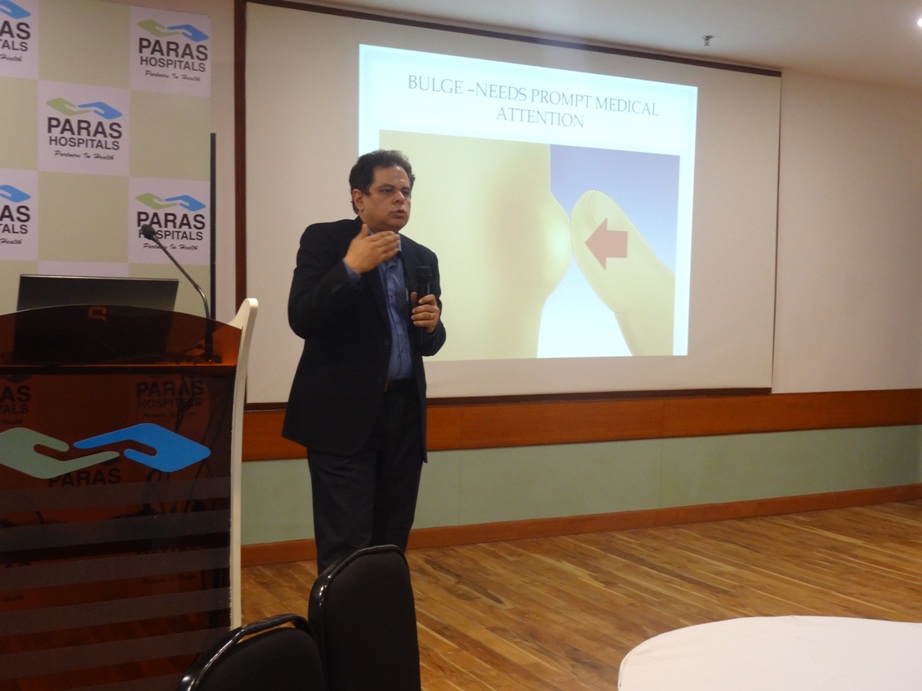Apr 25, 2022
Paras Hospitals,Gurgaon Launches Special Hernia Clinic;Conducts 2-day Camp to Treat 30 Underprivileged Patients

The camp organized in association with Hernia International offers surgery to 30 underprivileged people at highly subsidized charges.
Ramesh Dhankar, CMO , Civil Hospital chief guest for launch of Hernia Clinic
Hernia is a serious yet highly underestimated health concern in India. When left ignored or not treated in time it can even be life threatening in certain cases. In a bid to raise awareness about the disorder and educate people about treatments, Paras Hospital, Gurgaon conducted a two-day special Hernia Camp in association with Hernia International, to provide Hernia surgery to underprivileged people suffering from the condition.

The camp attended by a team of 8 doctors was organized especially for underprivileged people provided the surgical treatment at highly subsidized rates. At the two-day camp (Nov 30- Dec 1) surgery was performed on as many as 30 underprivileged hernia patients.
Dr. Teresa Butron, Senior Consultant, Hernia International and Dr. Meenakshi Sharma, Senior Consultant , General & Lap Surgery, Paras Hospitals, Gurgaon lead the team of doctors who examine patients. Other doctors of the team included Dr. Rakesh Dhurkhure, Senior Consultant, Dr. Alok Gupta, Senior Consultant, Dr. Vikas Kapur, Senior Consultant, and Dr. Naveen Satija, Consultant, Dr. Rajat Ahluwalia from Paras Hospitals, Gurgaon.

Paras Hospitals, Gurgaon also launched its dedicated Hernia Clinic in which patients will be given treatment and offered specialized advice on preventing recurrence. A common but understated health problem, hernias of the abdominal wall affect a large number of people and need surgical correction to prevent further complications. However, in some cases an abdominal wall tears up again after a surgery leading to serious potential complications on the health of the patient.
A hernia happens when an organ pushes and tears up a weak area, tissue or muscle and bulges out of its assigned space. Most common hernias happen in the abdomen. For example, intestines may break through the muscles in a weakened area of the abdominal wall. Though most common in the abdomen, hernias also appear in the thigh and groin areas. The only way to effectively treat a hernia and provide lasting relief is to have it surgically corrected.

“In the West awareness about hernia is high and people take this disorder seriously. In low socioeconomic countries like India, however, the awareness remains low and many people even delay surgical intervention for a long time, considering it a minor concern. It is important to educate people that delaying treatment can cause serious repercussions,” says Dr. Teresa Butron, Senior Consultant, Hernia International.
Hernia surgery has undergone a major revolution because of the advent of laparoscopy especially in recurrent hernias which are considered as complicated hernias. Doctors at Paras Hospitals, Gurgaon are equipped at performing minimally invasive laparoscopic surgery.
“Laparoscopic repair has been proved to be having better results than conventional open surgery especially because of reduced post operative pain, post operative wound infection, reduced hospital stay and earlier return to work. Unlike conventional surgery in which a large incision of 3-4 inches is made, in laparoscopic hernia repair three tiny incisions are needed. This involves no cutting into the muscles and tissues and logically causes much less trauma and bleeding. It also leads to a much quicker recovery and return to normal life,” says Dr Meenakshi Sharma, Senior Consultant, General & Lap Surgery, Paras Hospitals, Gurgaon.
“I’m happy to be part of the effort that is dedicated to not only spread awareness about Hernia but also treat underprivileged people who otherwise do not have the financial wherewithal of undergoing a surgery,” said Dr. Ramesh Dhankar, CMO , Civil Hospital.

Hernia is not always a life-threatening disease; however, the condition in itself is very painful. Primarily occurring in the abdominal walls, there are several types of Hernia, of which inguinal (inner groin), incisional (resulting from an incision), femoral (outer groin), umbilical (belly button), and hiatal (upper stomach) are the most common types.
“Inguinal hernias make up of 70% of all hernia. Being the groin region, many people shy away from discussing and sharing the problem with others and even reporting it to the doctor. This results in delay in treatment,” added Dr.Meenakshi, Senior Consultant, General & Lap Surgery, Paras Hospitals, Gurgaon.
While in some cases hernia is congenital, in other it occurs later in life. Occurrence of hernia can be identified by the swelling or protrusion, which can be felt easily. Besides, ultrasound is used to diagnose a femoral hernia, while to determine the presence of bowel obstruction.

